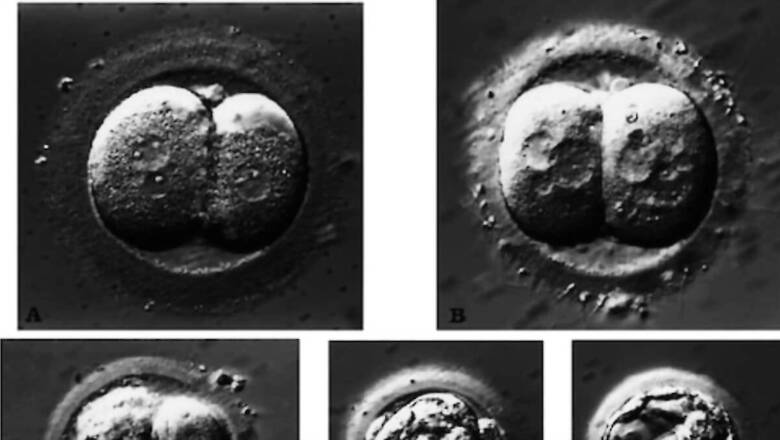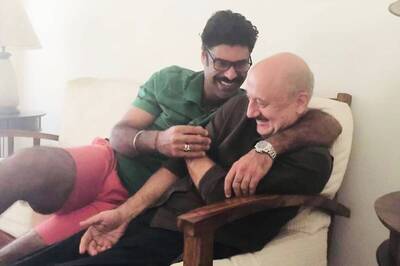
views
A court in the US has ruled that the frozen embryos used for in vitro fertilisation (IVF) could be considered children, and destroying them would amount to lawsuits filed by parents for the death of the minors.
The decision by the Supreme Court in Alabama has raised several concerns regarding the future of IVF in the state, with many service providers halting the treatment after the court order.
Some anti-abortion groups have hailed the judgment arguing that the embryos need greater legal protection.
How did the court reach the verdict?
The ruling revived two lawsuits filed by three sets of parents who underwent IVF procedures to have babies and then chose to have the remaining embryos frozen.
The lawsuits accused Mobile, Alabama fertility clinic, Center for Reproductive Medicine, and the hospital where it is located, Mobile Infirmary, of failing to properly safeguard frozen embryos, resulting in their destruction.
The parents alleged in December 2020 that a patient at the Mobile fertility hospital where the frozen embryos were stored entered the fertility clinic and destroyed several embryos through the cryogenic nursery, as per the Supreme Court’s ruling.
The patient’s hands were “freeze burned” due to the low temperature in which the embryos were stored, and the patient dropped them on the floor, killing them, according to the ruling, as quoted by CNN.
The parents sued for wrongful death but a trial court dismissed their claims, finding the “cryopreserved, in vitro embryos do not qualify as a ‘person’ or ‘child,’ therefore, the lawsuit could not move forward.
But the Alabama Supreme Court supported the couple, and ruled that the frozen embryos were children.
Should Embryos be Considered Children?
The Alabama Supreme Court found that it was long established that unborn children are “children” for the purpose of the 1872 wrongful death law at issue in the case.
The court ruled that they should consider embryos as children in an amendment to the Constitution in 2018 to include protection of unborn life.
Chief Justice Tom Parker wrote in his overtly religious concurring opinion, as quoted by CNN, “We believe that each human being, from the moment of conception, is made in the image of God, created by Him to reflect His likeness.”
What Does It Mean for Patients, IVF Clinics?
At least three IVF providers, the University of Alabama at Birmingham Health System, Alabama Fertility and The Center for Reproductive Medicine at Mobile Infirmary, which was sued in the court case, have suspended their services after the ruling.
The ruling has certainly created confusion among patients, opening the question whether destroying a frozen embryo could amount to criminal homicide. This also means that the legislature would determine whether IVF could continue in the state.
The Medical Association of the State of Alabama said in a statement: “The significance of this decision impacts all Alabamians and will likely lead to fewer babies — children, grandchildren, nieces, nephews, and cousins — as fertility options become limited for those who want to have a family”.
The US Abortion Debate
In 2022, the US ruled that abortion at any stage of pregnancy is illegal, and opened doors for the state to make their own laws on the issue.
The White House called the Alabama ruling “exactly the type of chaos that we expected when the Supreme Court overturned Roe v Wade and paved the way for politicians to dictate some of the most personal decisions families can make”.
According to a Pew Research, about six-in-ten adults (57%) disapprove that the US Constitution does not guarantee a right to abortion and that abortion laws can be set by states, while 41% approve of the ruling.
What is IVF?
According to the Mayo Clinic’s website, in the procedure, mature eggs are collected from ovaries and fertilised by sperm in a lab. Then a procedure is done to place one or more of the fertilised eggs, called embryos, in a uterus, which is where babies develop.
One full cycle of IVF takes about 2 to 3 weeks. Sometimes these steps are split into different parts and the process can take longer.
IVF can be done using a couple’s own eggs and sperm. Or it may involve eggs, sperm or embryos from a known or unknown donor to create a pregnancy, but it is not guaranteed and take several attempts or years.
In the Alabama trial, the fertilised embryos were frozen and stored in tanks containing liquid nitrogen for up to a decade, experts say, as quoted by BBC.



















Comments
0 comment